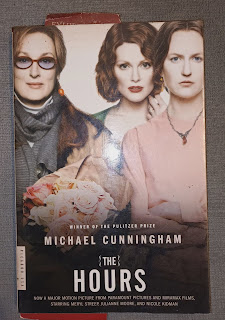When I first read The Hours, I didn’t know a
novel could hold so many worlds in a single breath. Michael Cunningham’s
Pulitzer-winning book unfolds like a literary triptych—three women in three
different times, all tethered by one haunting narrative thread: Virginia
Woolf’s Mrs. Dalloway. And yet, it’s not merely homage. The
Hours becomes its living, breathing thing—timeless, intimate, and
dazzlingly recursive.
I came to this novel already reverent of Virginia Woolf. Her
stream-of-consciousness prose and raw insight into mental illness had marked
me. So, when Cunningham dared to reimagine Woolf—not just as a character, but
as a connective tissue between modern lives—I read with equal parts wonder and
skepticism. I found it as masterful as it was deeply informed.
What many readers might not know is that Cunningham studied
Virginia Woolf extensively in college. His fascination with her wasn’t
fleeting; it was deep, rigorous, scholarly. He has said in interviews that the
seeds of The Hours were planted during this time, when his
close reading of Mrs. Dalloway and Woolf’s diaries began to
evolve into something more personal, more novelistic. The Hours is
the fruit of that long, respectful engagement—a work born not of imitation but
of immersion.
In The Hours, we follow:
- Virginia
Woolf in 1923, battling her mind while beginning Mrs.
Dalloway in Richmond.
- Laura
Brown, a 1950s housewife in Los Angeles, suffocating under the weight
of domestic life as she secretly reads Mrs. Dalloway.
- Clarissa
Vaughan, a modern-day version of Mrs. Dalloway, living in New York
City, throwing a party for her friend and former lover who is dying of
AIDS.
At first, these women seem disparate. But Cunningham merges
their stories through carefully mirrored moments—a cake that fails, a kiss that
confuses, a party that never quite arrives. These resonances are where the
novel sings. Time folds in on itself. Character becomes archetype. Clarissa is
both herself and a reincarnation of Woolf’s Clarissa Dalloway. Laura Brown is
reading Mrs. Dalloway, but she is also somehow in it.
Writing the Edges of Reality
What struck me most was how Cunningham writes internal
monologues that feel suspended between thought and breath. Like Woolf, he isn’t
afraid to linger on a detail, to allow a character’s day to unfold across
pages. But unlike Mrs. Dalloway, The Hours makes
the shifting explicit. It’s a modern novel conscious of its lineage.
And yes, there are moments when Cunningham writes as if
channeling Woolf directly—her melancholia, her clarity, her frailty, and her
genius. His Virginia is not a caricature. She is a woman living on the edge of
life and death, brilliance and despair. The decision to begin the novel with
Woolf’s suicide note is gutting and brave.
The Film: Expanding the Echo
I watched Stephen Daldry’s 2002 film adaptation of the story.
With Meryl Streep, Julianne Moore, and Nicole Kidman (who won an Oscar for her
portrayal of Woolf), the film maintains the story’s lyrical fluidity. Philip
Glass’s score threads the timelines together like breath. Some changes are
inevitable, but the spirit remains: fractured identities, temporal bleed, the
weight of art and ordinary hours.
What the film does especially well is visualize the
mirroring. It lingers on hands, flowers, mirrors—reminders that each woman is
both singular and plural. Watching it felt like rereading the novel in another
language I already knew.
Why I Find this Book Useful for Teaching Literature
The Hours isn’t just a literary fan letter. It’s a conversation across time about what it means to live a meaningful life when death is always near. It’s about the agony and necessity of writing. It’s about queer love, motherhood, depression, and the everyday moments that shape us.
As a writer, I found it inspiring. As a woman, I found it unsettling and true. As a Woolf reader, I found it luminous. If you’ve ever felt seen by Mrs. Dalloway or been undone by Virginia Woolf’s sentences, The Hours will also open something inside you. And if you haven’t yet met Woolf, this story is a door.








